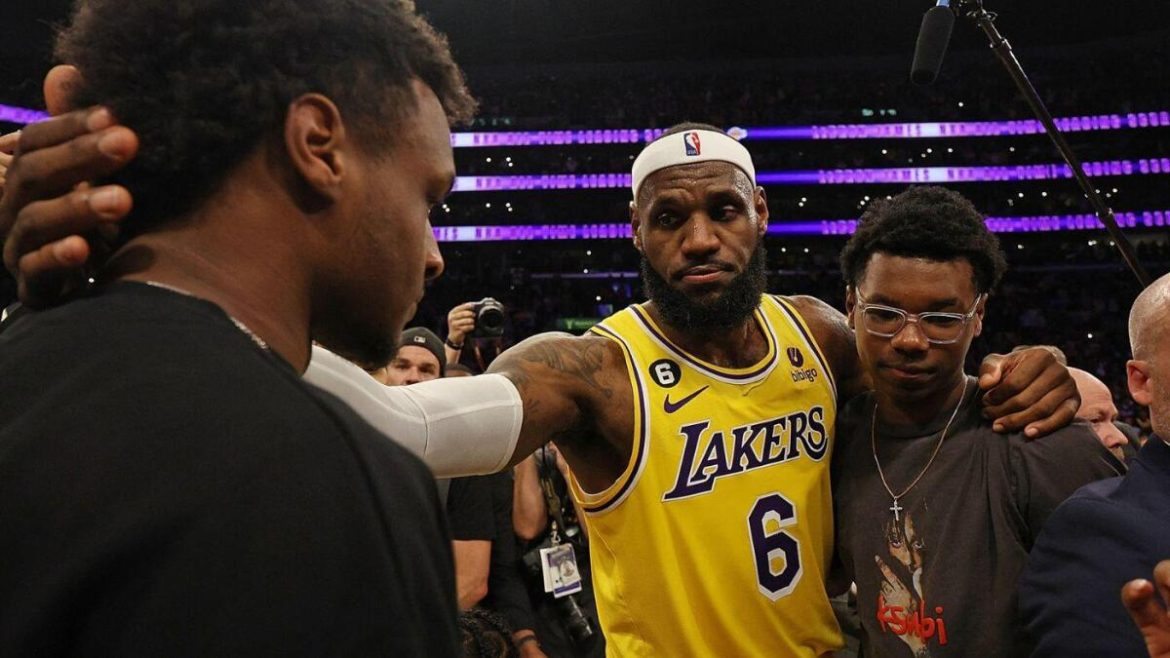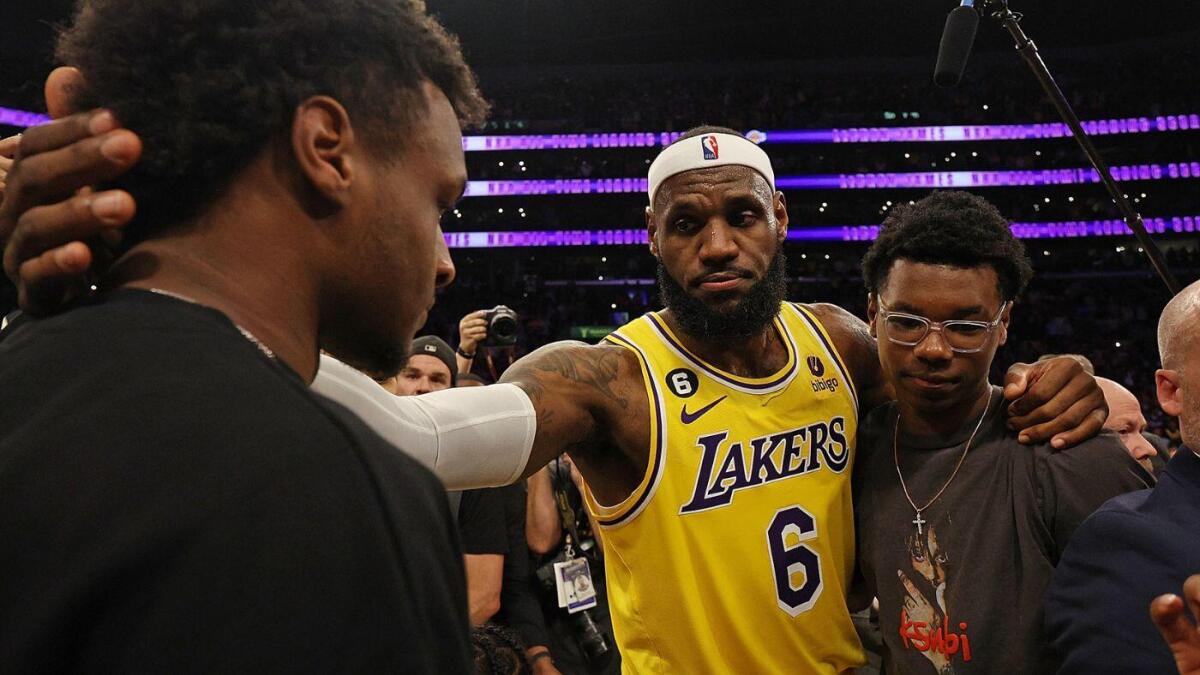LeBron James: Embracing a Hands-Off Approach to His Sons’ Basketball Development
LeBron James, one of basketball’s most iconic figures, has recently shed light on his parenting philosophy, particularly regarding his famous sons Bronny and Bryce James and their basketball careers. While it might seem natural for a superstar athlete and father to take a front-row seat in coaching or managing his children’s basketball progress, LeBron has chosen a markedly different path—one characterized by trust, accountability, and intentional distance from his sons’ coaches. This report examines LeBron’s approach, its implications on his sons’ development, and the broader context of handling legacy and parenting in the high-pressure world of elite sports.
Trusting the Coaches: A Foundation of Accountability
LeBron James articulates his conviction that the developmental relationship between a player and their coach is sacred and should remain free from external interference, even from a parent with his vast basketball pedigree. He openly admits, “I’ve never got involved with my kids’ coaches. From Bronny growing up to where he is now, and Bryce on his way to Tucson, to Arizona, I’ve never got involved.”
This deliberate hands-off strategy stems from his desire not to shield his sons from tough coaching or to allow their famous surname to garner them any special treatment. His straightforward hope is that coaches “say what the f**k you need to say” to his boys, emphasizing the unvarnished truth that tough coaching is often necessary for growth. Consciously, LeBron resists the urge to coddle or micromanage, instead wanting his sons to “hold themselves” accountable and face the realities of competition and high expectations head-on.
Respecting the Coaching Process: Avoiding Overreach
LeBron’s unwillingness to “sit through a whole practice” or “get on the phone” with Bronny and Bryce’s coaches highlights his respect for the boundaries of coaching authority. Such restraint ensures that the coaches can operate without pressure or influence from an NBA superstar parent, fostering an environment where the boys must prove themselves purely on merit and responsiveness to coaching.
This is a forward-thinking approach, especially given the pressure and media attention surrounding the James name. It keeps the competitive environment balanced and free from allegations of favoritism, allowing Bronny, now a Los Angeles Lakers player, and Bryce, preparing for collegiate play, to earn their place through dedication and skill rather than entitlement.
Navigating Fame, Legacy, and Fatherhood
LeBron’s decision reflects his nuanced understanding of the intersection between his legacy and his sons’ athletic development. Aware that their basketball journeys will be scrutinized intensely, LeBron avoids imposing his will, preferring instead that his sons carve out their own identities within the sport.
By not interfering, he mitigates the risk of negative perceptions about nepotism or undue influence, creating room for Bronny and Bryce to mature into athletes under the guidance of trusted professionals. His philosophy challenges the often-observed pattern of celebrity parents heavily managing their children’s sports careers and instead exemplifies a more empowering and autonomy-granting form of parenting.
Contrast with Traditional Involvement: A New Model
The typical narrative for superstar athletes with children in the same sport often features close parental involvement in coaching decisions, training strategies, or recruitment choices. LeBron’s path deviates from this script, representing a more modern, trust-based model where parents recognize and respect the expertise of coaches and the agency of their children.
This approach speaks to a broader trend among elite athletes who grapple with balancing public expectations, private family dynamics, and their children’s personal development. LeBron’s candid remarks on his podcast with Steve Nash reveal a refreshing honesty and humility, acknowledging that even he must step back and let his sons face challenges without his intercession.
Impact on Bronny and Bryce’s Development
The benefits of LeBron’s hands-off approach might manifest in several ways. For one, it could build resilience and independence in Bronny and Bryce, teaching them to navigate coaching criticism and build their basketball IQ without relying on paternal intervention. It also encourages a professional respect between player and coach that might be undermined if a parent with superstar status consistently interjected.
Furthermore, it prepares the boys for future challenges in their careers, where self-motivation and accountability are paramount. This dynamic may help them manage the inevitable pressures of living up to their father’s legacy with a sense of ownership and personal pride in their accomplishments.
A Unique Parenting Philosophy Rooted in Love
At its core, LeBron James’ approach is a profound expression of fatherly love and wisdom. His intent is not to distance himself emotionally but to empower his sons to grow through authentic experiences, successes, and setbacks. This philosophy underscores a belief that true support sometimes requires stepping back and allowing natural growth processes to unfold.
LeBron’s candidness about never attending entire practices or directly communicating with coaches offers a counterpoint to the common perception that celebrity parents must be omnipresent and controlling. Instead, his stance suggests confidence in both his sons’ talents and the coaching staff charged with their development.
Conclusion: Redefining Legacy Through Empowerment
LeBron James is not just a basketball legend but also a father redefining what legacy means in a sports family. His intentional distancing from Bronny and Bryce’s coaching processes is a testament to trust, respect, and a commitment to authentic growth. By refusing to shield or overly protect his sons, he models accountability and resilience, arguably the core traits his children will need to thrive — on the court and beyond.
This approach invites reflection on how elite athletes can navigate the complexities of family, fame, and professional success without blurring boundaries. LeBron’s philosophy shows that sometimes the greatest form of involvement is knowing when to step back, inspire confidence, and instill the grit required to succeed in the fiercely competitive world of basketball.





